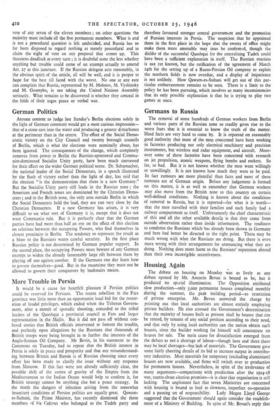More Trouble in Persia
It would be a cause for heartfelt pleasure if Persian politics could be reserved for Persians. The recent rebellion in the Fars province was little more than an opportunist local bid for the restor- ation of feudal privileges, which ended when the Teheran Govern- ment, after a month of sporadic shooting, conceded to the tribal leaders of the Quashqui a provincial council at Fars and larger representation in the Majlis. But it did not pass off without con- fused stories that British officials intervened to foment the trouble, and perfectly open allegations by the Russians that thousands of British troops were being brought in to further the interests of the Anglo-Iranian Oil Company. Mr Bevin, in his statement to the Commons on Tuesday, had to repeat that the British interest in Persia is solely in peace and prosperity and that any misunderstand- ing between Britain and Russia is of Russian choosing since every effort has been made to clarify the issue without any response from Moscow. If this fact were not already sufficiently clear, the possible shift of the centre of gravity of the Empire from the Mediterranean to the Indian Ocean would help to confirm it, for British strategy cannot be anything else but a peace strategy. In the north the dangers of infection arising from the somewhat insanitary conditions of Persian politics are equally great. Qawam- es-Sultani, the Prime Minister, has recently dismissed the three members of his Cabinet who belonged to the Tudeh party and
therefore favoured stronger central government and the promotion of Russian interests in Persia. The suspicion that he appointed them in the first place in the hope that the sweets of office might make them more amenable may thus be confirmed, though the dislike of the successful Quashqui for the centralising Tudeh could have been a sufficient explanation in itself. The Russian reaction is not yet known, but the ratification of the agreement of March 24th for the setting up of a Russo-Persian Oil company to exploit the northern fields is now overdue, and a display of impatience is not unlikely. How Qawam-es-Sultani will get out of this par- ticular embarrassment remains to be seen. There is a limit to the policy he has been pursuing, which involves so many inconsistencies that its only possible explanation is that he is trying to play two games at once.






























 Previous page
Previous page